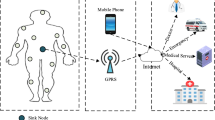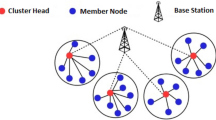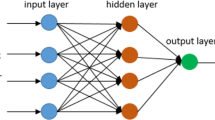Abstract
Wireless Sensor Networks (WSN) is an efficient network for monitoring and recording the physical environment and transfers the monitored data into the central location using widely distributed sensor nodes. One of the main problems in WSN is the issue of developing an energy-efficient routing protocol that achieves less energy consumption and enhances the lifetime of the network. During the past decades, a researcher uses the mobile sink to reduce the energy problem and hotspot problems. In this paper, a dynamic routing protocol named Reinforcement-Learning based energy Efficient Optimized Routing (RLER) is proposed to reduce the energy consumption of the nodes and to protract the lifetime of the network. In the proposed work (RLER), Grid- Tree-based clustering is employed, and the root node(RN) selection is done by using the RLFIS algorithm, which uses the three parameters Bipartivity Index (BI), Neighbourhood Overlapping (NOVER) and Algebraic Connectivity (AC) to select the root node. Then the tree structure is formed by the root node inside the grid based on the energy and transmission range of the nodes, which supports the inter-cluster communication within the grids. Hybrid BAT-Crow (BCSA) Search Algorithm is used to relocate the sink node based on the fitness value of the nodes. The experimental results show that the proposed methodology (RLER) provides better results in energy consumption and improves the lifetime of the network. The proposed RLER simulation is done on the OMNeT + + platform.




















Similar content being viewed by others
Data Availability
Data sharing is not applicable to this article as no datasets were generated or analysed during the current study.
References
Wang D, Liu J, Yao D, Member IE (2020) An energy-efficient distributed adaptive cooperative routing based on reinforcement learning in wireless multimedia sensor networks. Comput Netw 178:107313
Jain A, Goel AK (2020) Energy efficient fuzzy routing protocol for wireless sensor networks. Wirel Pers Commun 110(3):1459–1474
Sheng Z, Mahapatra C, Zhu C, Leung VC (2015) Recent advances in industrial wireless sensor networks toward efficient management in IoT. IEEE 3:622–637
Wang CF, Shih JD, Pan BH, Wu TY (2014) A network lifetime enhancement method for sink relocation and its analysis in wireless sensor networks. IEEE Sensors J 14(6)
Verma VK, Singh S, Pathak NP (2014) Analysis of scalability for AODV routing protocol in wireless sensor networks. Optik 125(2):748–750
Das SK, Tripathi S (2017) Energy efficient routing formation technique for hybrid ad hoc network using fusion of artificial intelligence techniques. Int J Commun Syst 30(16):e3340
Hou R, He L, Shan Hu, Luo J (2018) Energy-balanced unequal layering clustering in underwater acoustic sensor networks. IEEE Access 6:39685–39691
Xing G, Chen Y, Hou R, Dong M, Zeng D, Luo J, Ma M (2021) Game-theory-based clustering scheme for energy balancing in underwater acoustic sensor networks. IEEE Internet Things J 8(11):9005–9013
Moussa N, El Belrhiti El Alaoui A (2021) An energy-efficient cluster-based routing protocol using unequal clustering and improved ACO techniques for WSNs. Peer Peer Netw Appl 14(3):1334–1347
Arora VK, Sharma V, Sachdeva M (2019) A distributed, multihop, adaptive, tree-based energy-balanced routing approach. Int J Commun Syst 32(9)
Singh J, Rai CS (2018) An efficient load balancing method for ad hoc networks. Int J Commun Syst 31(5):e3503
Singh J, Rai CS (2016) An optimized prioritized load balancing approach to scalable routing (OPLBA). Wireless Netw 22(1):319–334
Bhola J, Soni S, Cheema GK (2020) Genetic algorithm based optimized leach protocol for energy efficient wireless sensor networks. J Ambient Intell Humaniz Comput 11(3):1281–1288
Nivedhitha V, Saminathan AG, Thirumurugan P (2020) DMEERP: A dynamic multi-hop energy efficient routing protocol for WSN. Microprocess Microsyst 79:103291
Yun W-K, Yoo S-J (2021) Q-Learning-Based Data-Aggregation-Aware Energy-Efficient Routing Protocol for Wireless Sensor Networks. IEEE Access 9:10737–10750
Basha AR (2020) Energy efficient aggregation technique-based realisable secure aware routing protocol for wireless sensor network. IET Wireless Sens Syst 10(4):166–174
Karmel A, Vijayakumar V, Kapilan R (2019) Ant-based efficient energy and balanced load routing approach for optimal path convergence in MANET. Wirel Netw 1–13
Haque ME, Baroudi U (2018) Dynamic energy efficient routing protocol in wireless sensor networks. Wirel Netw 1–19
Rodríguez A, Del-Valle-Soto C, Velázquez R (2020) Energy-efficient clustering routing protocol for wireless sensor networks based on yellow saddle goatfish algorithm. Mathematics 8(9):1515
Singh H, Singh D (2021) Hierarchical clustering and routing protocol to ensure scalability and reliability in large-scale wireless sensor networks. J Supercomput 1–19
Chan L, Gomez Chavez K, Rudolph H, Hourani A (2020) Hierarchical routing protocols for wireless sensor network: A compressive survey. Wirel Netw 26(5):3291–3314
Liu Y, Qiong Wu, Zhao T, Tie Y, Bai F, Jin M (2019) An improved energy-efficient routing protocol for wireless sensor networks. Sensors 19(20):4579
Bendigeri KY, Mallapur JD, Kumbalavati SB (2021) Direction Based Node Placement in Wireless Sensor Network. In 2021, International Conference on Artificial Intelligence and Smart Systems (ICAIS), pp 1306–1313. IEEE
Jayarajan P, Kanagachidambaresan GR, Sundararajan TVP, Sakthipandi K, Maheswar R, Karthikeyan A (2020) An energy-aware buffer management (EABM) routing protocol for WSN. J Supercomput 76(6):4543–4555
Ghoul R, He J, Hawbani A, Djaidja S (2019) Energy Efficient Balanced Tree-Based Routing Protocol for Wireless Sensor Network (EEBTR). In Proceedings of the Future Technologies Conference, Springer, Cham, pp 795–822
Qin J, Fu W, Gao H, Zheng WX (2017) Distributed k-means algorithm and fuzzy c-means algorithm for sensor networks based on multi agent consensus theory. IEEE Trans Cybern 47(3):772–783
Sert SA, Alchihabi A, Yazici A (2018) A two-tier distributed fuzzy logic based protocol for efficient data aggregation in multihop wireless sensor networks. IEEE Trans Fuzzy Syst 26(6):3615–3629
Al-Ghamdi B, Ayaida M, Fouchal H (2020) Performance evaluation of scheduling approaches for wireless sensor networks. Wireless Pers Commun 110(3):1089–1108
Logambigai R, Ganapathy S, Kannan A (2018) Energy–efficient grid–based routing algorithm using intelligent fuzzy rules for wireless sensor networks. Comput Electr Eng 68:62–75
Wang C, Zhang Y, Wang X, Zhang Z (2018) Hybrid multihop partition-based clustering routing protocol for WSNs. IEEE Sens Lett 2(1):1–4
Maheshwari P, Sharma AK, Verma K (2021) Energy efficient cluster based routing protocol for WSN using butterfly optimization algorithm and ant colony optimization. Ad Hoc Netwo 110:102317
Thangaramya K, Kulothungan K, Logambigai R, Selvi M, Ganapathy S, Kannan A (2019) Energy aware cluster and neuro-fuzzy based routing algorithm for wireless sensor networks in IoT. Comput Netw 151:211–223
Selvi M, Thangaramya K, Ganapathy S, Kulothungan K, Nehemiah HK, Kannan A (2019) An energy aware trust based secure routing algorithm for effective communication in wireless sensor networks. Wireless Pers Commun 105(4):1475–1490
El Alami H, Najid A (2018) MS-routing-G i: routing technique to minimise energy consumption and packet loss in WSNs with mobile sink. IET Networks 7(6):422–428
Liu Z, Guo S, Wang L, Du B, Pang S (2019) A multi-objective service composition recommendation method for individualized customer: hybrid MPA-GSO-DNN model. Comput Ind Eng 128:122–134
Askarzadeh A (2016) Electrical power generation by an optimised autonomous PV/wind/tidal/battery system. IET Renew Power Gener 11(1):152–164
Srivastava S, Sahana SK (2019) Application of bat algorithm for transport network design problem. Appl Comput Intell Soft Comput
Wang Z, Ding H, Li B, Bao L, Yang Z (2020) An energy efficient routing protocol based on improved artificial bee colony algorithm for wireless sensor networks. IEEE Access 8:133577–133596
Vinitha A, Rukmini MSS (2019) Secure and energy aware multi-hop routing protocol in WSN using taylor-based hybrid optimization algorithm. King Saud Univ - Comput Inf Sci
El Alami H, Najid A (2019) ECH: An enhanced clustering hierarchy approach to maximize lifetime of wireless sensor networks. IEEE Access 7:107142–107153
Munuswamy S, Saravanakumar JM, Sannasi G, Harichandran KN, Arputharaj K (2018) Virtual force-based intelligent clustering for energy-efficient routing in mobile wireless sensor networks. Turk J Electr Eng Comput Sci 26(3):1444–1452
Keerthika A, Hency V (2021) Energy aware tree-based sink relocation routing protocol to improve the lifetime of wireless sensor networks. Int J Commun Syst 34(9)
Author information
Authors and Affiliations
Corresponding author
Ethics declarations
Conflict of interest
There is no conflict of interest.
Additional information
Publisher's Note
Springer Nature remains neutral with regard to jurisdictional claims in published maps and institutional affiliations.
Rights and permissions
About this article
Cite this article
Keerthika, A., Berlin Hency, V. Reinforcement-Learning based energy efficient optimized routing protocol for WSN. Peer-to-Peer Netw. Appl. 15, 1685–1704 (2022). https://doi.org/10.1007/s12083-022-01315-6
Received:
Accepted:
Published:
Issue Date:
DOI: https://doi.org/10.1007/s12083-022-01315-6




